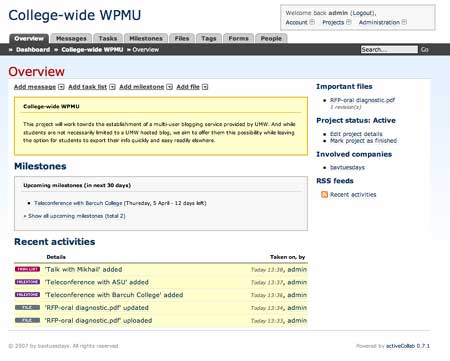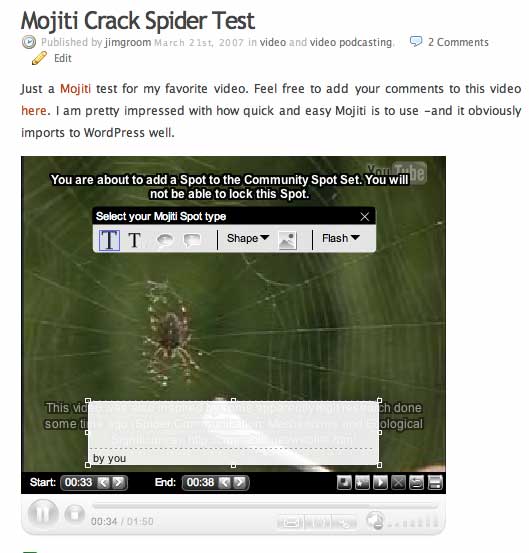Update: If I wasn’t so self-absorbed, I would have realized much sooner that Andy Rush, our resident multi-media god, has already built UMWTube, something quite similar to a YouTube inspired Drupal site but framed out using Ning. So there is yet another angle to pursue. You can request an invitation to see this site here.
The edtech blogosphere has been pretty active as of late with discussions surrounding the role of online, user-generated videos in education. On Thursday, George Siemens posted about VideoLectures, a site that features online video-taped lectures of academics that are open to the public. On Friday, he posted “Formal and informal…control vs foster” which briefly frames some of the issues surrounding the corporate battles currently being fought over the online video distribution market. Also on Friday, The Washington Post’s Business section had an article, “For YouTube, This is a Test,” that named the media companies involved (NBC Universal, News Corp., AOL, Yahoo!, and Microsoft) in a partnership to develop a new online video service -in the spirit of iTunes- that will be a mix of free and “for a fee” content to protect their “interests” against the dominant YouTube. Copyright violation has obviously helped to frame the tenor for this clash of the corporate titans -but what is to stop us in education from building or own?
Would educational institutions building their own prove to be “just another silo?” This is a question Alan Levine asked in his recent post about TeacherTube -a site based on the YouTube model that deals specifically with educational content. That’s is a crucial question that needs to be considered, so with this potential pitfall in mind, I’ll go on. After the NMC Online Conference on the Convergence of Web Culture and Video conference, D’Arcy Norman suggested that a YouTube like framework could readily be built out using the open source CMS Drupal. If this proves to be the case, and the pieces fit together so that students and instructors can quickly and easily upload their videos (in various formats and sizes) to a campus “UTube,” why would we need to worry about the corporate battles being waged currently?
Students will continue to use services like YouTube and that’s great. But the logic and success of YouTube is not only about the large-scale social network that frames the experience for many users (although this is an essential part of it), it is also provides a simple process for uploading, compressing, converting, and storing video online. Moreover, the accompanying unique static URL for each video and embed code makes this media quickly and easily portable to a blog, wiki, website, etc. This idea of the easily portable URL (if it is possible) opens up the potential for creating a space (especially if it is relatively easy) on campus that is open and encourages students to start thinking through the ideas they are grappling with through the lens of video. What would make this endeavor even more powerful would be an online video editing suite for students. There are already services out their like jumpcut, photobucket, etc., that may do the trick, but if a university (or series of universities) wanted to go the extra mile, create a quick and easy video editor with Ruby on Rails and Flash, like this one at The American Image exhibit.
As an aside: what about an online video editing suite for college campus that plays nice with Drupal (as well as some other open source CMS, DAMS, etc.) might be a really cool idea for a MacArthur grant. Make it open source and design a system that would start linking video content between campuses via RSS -a video facebook for universities that focuses upon the academic uses of videos for universities more broadly -students sharing their video projects with other students from a host of different universities.
Introducing a social framework on campus that engages the creative and intellectual possibilities of video within a more immediate space that is open and can be freely re-framed on a blog or within a wiki marks a moment where universities might begin to acknowledge and engage the possibilities of online video for the learning experience. The idea that professors having to be “video experts” or “editing gurus” for this to be of value at a liberal arts university may be short sighted.
What needs to happen is that professors and students are encouraged to explore the educational possibilities of video both inside and outside of the classroom more seriously. Think about it, what if we find ways for institutions premised on higher learning (which if they are living up to their name are dealing with the most important questions regarding culture, ethics, law, science, etc.) to present their research, ideas, beliefs, arguments, etc to the public using video. We could very well be re-inspiring the logic of public broadcasting, using the university as the center of this intellectual exchange of ideas.
How might this begin to change the flow of content through the publishing tributaries of these major corporations. Rather than news stations like Fox and NBC calling on an “expert” to validate their nonsense, let students and professors frame their own experiences for the public, further populating the mediated space of the internet of a range of voices, ideas, viewpoints, etc. Keep in mind that this is by no means a call for video-taped lectures!!! This is a call for students and faculty to present their work to the world creatively. We already have the possibility to publish videos online for a larger audience using blogs, wikis, and more traditional websites. But we have not exposed students to quick and easy video editing tools that will allow them to bring various video resources together and edit them into an argument of some kind.
A university that fosters and encourages the more general exposure to such skills also affords the opportunity of blurring the lines that serve to reinforce a strict separation of the social and educational aspects of the college experience. Do we need to frame this discussion as a curricula shift wherein faculty are forced to teach video instead of text? Well, do we teach students how to give a PowerPoint presentation? -I’d say no, yet I see students using them all the time in the classroom. Part of the excitement of a tool like PowerPoint for me (not that long ago), was the fact that I could bring other resources like images, sound and video to an experience I want to share with others. Are we doing every thing we can to foster the same possibilities within the university for what has now become a ubiquitous medium? Additionally, can we afford to use the thinly veiled excuse of a general “lack of expertise” with the tools as a reason not to start thinking seriously about video and digital literacy for the 21st century?





